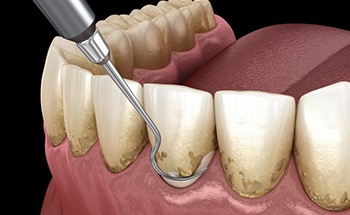Gum Disease Treatment - Woodstock, GA

Gum disease impacts more than half of adults over the age of 30, and advanced gum disease is the leading cause of tooth loss for patients over the age of 35. This oral health condition has also been linked to a number of whole body health concerns like diabetes and heart disease. At Dream Dental, our skilled team works hard to help patients keep their teeth and gums healthy to avoid gum disease, but when this isn’t possible, we offer a variety of options for gum disease treatment in Woodstock to restore oral health and keep patients smiling. If you want to find out more, call our dental office to find out more or schedule your six-month dental exam and teeth cleaning appointment today.
What is Gum Disease?

Periodontal disease, more often referred to simply as gum disease, is an oral health condition that occurs when plaque and tartar buildup at and below the gum line irritates soft tissue. Over time, sores occur, and the acidic plaque destroys the connective bone and gum tissues that hold teeth in place. In the earliest stages, called gingivitis, this disease causes little to no negative effects on oral health and can be easily remedied in partnership with your dentist. When left untreated, gum disease develops into the more severe form of the condition called periodontitis. This form of the disease leads to severe side effects, including tooth loss.
How do I Know I Have Gum Disease?

During six-month dental exams, our team members will be looking for the indicators that you have even the mildest case of gum disease. This includes measuring the pockets between teeth and gums, since one of the first indicators of the disease is soft tissue recession. The mild form of gum disease, gingivitis, can be easily treated with more frequent trips to our dental office for teeth cleanings and some small changes to your dental care at home. When gum disease reaches the more advanced periodontitis stage, the warning signs can be more serious. Some of the common side effects of gum disease you should be aware of include:
- Bleeding gums
- Changes in the color of soft tissue
- Swelling or inflammation in the soft tissue
- Receding gums or teeth that appear longer
- Infection or sores in the soft tissue
- Changes in the way teeth fit together or teeth that feel loose
- Chronic bad breath that doesn’t improve following oral hygiene
What Gum Disease Treatment Options Are Available?

In the early stages, periodontal disease may be treated with more frequent professional teeth cleanings and improved at-home hygiene. When gum disease reaches the more severe stages, we may need to provide more advanced treatments in addition to professional teeth cleanings, including the following:
- Scaling – systematic removal of plaque and tartar buildup at and below the gum line
- Root paling – smoothing of porous root surfaces to prevent the future buildup of plaque and tartar
- Antibiotic therapy – oral and/or topical antibiotics may be prescribed to reduce the numbers of plaque-producing oral bacteria that can lead to gum disease
Scaling & Root Planing

A scaling and root planing procedure is a kind of gum disease treatment that is designed to clean away plaque, tartar, and bacteria from the gum line and tooth roots. This process involves utilizing an ultrasonic cleaner to clear out debris before smoothing out the rough surfaces of the tooth roots to protect the gums from future decay and infection. Afterward, your smile will be better able to minimize plaque and germs from settling in your mouth in the long run.
Do You Need Scaling & Root Planing?

If you are experiencing the early stages of periodontal disease, then you might be able to reverse the effects of this complication with more conservative solutions, such as changing slightly your brushing and flossing techniques at home. Should your condition begin to worsen, our team might suggest that you undergo scaling and root planing. In most cases, common indications that you may require this treatment include:
- Gum recession
- Bleeding gums while brushing
- Visible plaque formation along the gum line
- Redness and inflammation in the gums
- Chronic bad breath (halitosis)
The Process of Scaling & Root Planing

This gum disease treatment usually requires several appointments to complete and mostly consists of two stages. To begin with, our dental team will use an ultrasonic scaler to thoroughly and carefully get rid of any plaque and tartar around your teeth and beneath the gum line. We will also clear out any harmful particles within the gum pockets.
After your scaling process is finished, our team will move forward with root planing. This technique involves smoothing out the surface of the tooth roots, which ends up making it significantly more difficult for bacteria and residue to accumulate around the teeth and gum line. This also decreases the risk of future infections. Of course, our team will provide you with local anesthesia so that you’re pain-free and comfortable throughout the procedure.
Aftercare Tips for Scaling & Root Planing

Once you’ve finished undergoing scaling and root planing, it typically takes about several weeks for your gums to fully heal. During your healing period, it’s important to minimize sensitivity and discomfort so that you can have a smooth experience. Try implementing the following measures:
- Rinse your mouth with salt water regularly
- Brush and floss gently and daily
- Stick to softer foods for at least 48 hours following your visit
- Avoid hot, cold, acidic, and spicy foods
